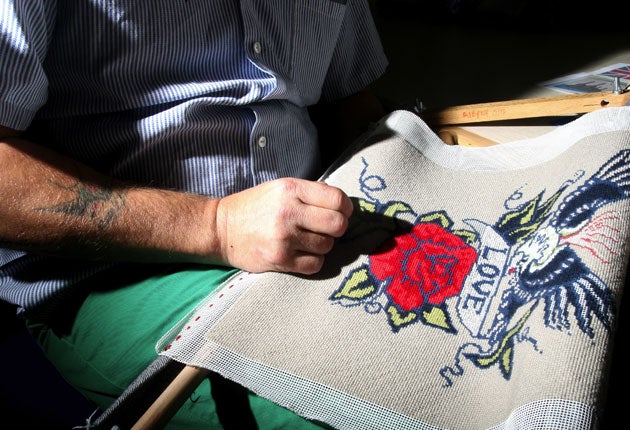Britain's prisoners sew their way to a better future

The thought of finding hardened criminals bent industriously over their embroidery, counting stitches and arguing over patchwork might seem far-fetched, but, for many inmates serving time at Her Majesty’s Pleasure, this unlikely scenario is not only a reality, but a highlight of their daily prison life.
The Fine Cell Work enterprise was launched in 1991 by Lady Anne Tree, who died earlier this year, as a way of allowing prisoners to earn money while gaining new skills, hope and independence through needlework and embroidery.
Recognised by prison authorities, wardens and prisoners alike as a way of improving confidence levels, channeling aggression and reducing stress, the scheme now runs in 30 prisons, with 400 prisoners, 80 per cent of whom are male, earning over £60,000 a year collectively through their work creating appliqué, tapestry and surface embroidery cushions; quilts; needlepoint rugs and hangings; and tapestry seat covers for furniture.
As anyone who has ever attempted to sew on a button, fix a loose hem or stitch up a rip - never mind embroider an entire cushion or quilt - will know: sewing is hard work. It requires concentration, patience, composure and dedication; it cannot be hurried and there is little room for error. So what do a load of violence-inclined, beefy men get out of it?
“We are working with men that you wouldn’t think would be stitchers,” agrees Elena Hall, Design Co-ordinator at Fine Cell Work, “but then they pick up a needle and find a calmness.”
Prisoners work for an average of 20 hours a week and report time and time again that sewing “helps the hours to pass,” says Elena. That they can earn money through their work (roughly a third of the final retail price) is another important aspect, allowing them to build up a small nest egg for when they get out, contribute to household bills or, most significantly, keep up with family, with whom they might otherwise lose touch over a long sentence.
“Because I had things to do, I was not in prison in my head,” says one ex-inmate, “It all came from the sewing really. You can easily become part of the prison system. But through the sewing I could afford to have a half hour on the phone every evening and that got me out the mindset: ‘I’m in prison.’”
While most inmates sign up to the scheme for the money, the real rewards of sewing become apparent later. “We send in volunteers to run the class and they bring amazing things out of these prisoners,” says Elena. “There’s a really high standard expected of them - some of them have never known that they’re actually good at anything. What we really want them to learn while they are in prison are transferrable skills such patience and perseverance,” which can help them to rebuild their lives when they return to the outside world.
At Fine Cell Work, each cushion, rug or quilt sold is done so with the prisoner’s name on it, helping to restore a sense of identity, independence and dignity. “We ask people to write and thank the prisoners for all the time they’ve spent on the item,” says Elena. “Those letters are incredibly important for letting the prisoners know that there are people on the outside, within the society from which they are technically excluded, that care.”
Fine Cell Work prisoners make a significant contribution to the world of interiors, carrying out bespoke work for international designers including William Yeoward, John Stefanidis, Jasper Conran, Kit Kemp (Artistic Director of the Firmdale Hotel Group) and Australian portrait photographer, Polly Borland; or creating pieces for insitutions such as English Heritage, the V&A, the National Gallery and the Tate Modern, to name a few.
The Fine Cell Work enterprise is funded 50 per cent by charitable donations and 50 per cent by sale of products, though it hopes to grow the latter in line with its goal of working with 1000 prisoners in the next five years. At HMP Wandsworth, Fine Cell Work has just opened a studio, where it is starting to introduce machine embroidery for specific projects. It will start teaching upholstery in the future and is also working on a qualification in soft furnishings, the idea being that prisoners can pursue and earn a living from these disciplines more easily than embroidery on the outside, should they choose.
For those interested in purchasing some of the prisoners’ work and lending their support to this remarkable enterprise, it is worth popping along to Fine Cell Work’s Christmas Emporium on Wednesday 10 November at the 20th Century Theatre, 291 Westbourne Grove Notting Hill from 10am-6pm, where cushions, throws, rugs and tapestry completed by Britain’s most disruptive individuals will be available to buy. Just don’t forget to write and say thank you if you do snap up something - it will mean a lot to someone, especially one who’s spending Christmas in a cell.
Emily Jenkinson is interiors writer for furniture and interior design website mydeco.com.
Subscribe to Independent Premium to bookmark this article
Want to bookmark your favourite articles and stories to read or reference later? Start your Independent Premium subscription today.

Join our commenting forum
Join thought-provoking conversations, follow other Independent readers and see their replies